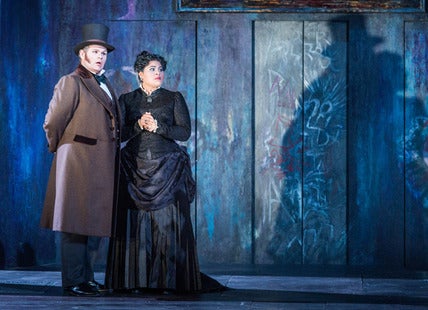Don Giovanni, Mozart, Opera North, Grand Theatre, Leeds

Your support helps us to tell the story
From reproductive rights to climate change to Big Tech, The Independent is on the ground when the story is developing. Whether it's investigating the financials of Elon Musk's pro-Trump PAC or producing our latest documentary, 'The A Word', which shines a light on the American women fighting for reproductive rights, we know how important it is to parse out the facts from the messaging.
At such a critical moment in US history, we need reporters on the ground. Your donation allows us to keep sending journalists to speak to both sides of the story.
The Independent is trusted by Americans across the entire political spectrum. And unlike many other quality news outlets, we choose not to lock Americans out of our reporting and analysis with paywalls. We believe quality journalism should be available to everyone, paid for by those who can afford it.
Your support makes all the difference.Despite its origins in Spanish legend, Spain is not important to Mozart’s and da Ponte’s Don Giovanni. So the placing of the story in the context of the early 1960s in Alessandro Talevi’s new production for Opera North is non-controversial.
Spain doesn’t matter, but class does. As in Figaro, the sexual arrogance of the upper-class male is challenged from below, by Masetto and his friends, albeit unsuccessfully. But Don Giovanni is a more old-fashioned opera than the superbly realistic Figaro. Giovanni evades every human challenge, and it takes supernatural intervention to punish him as he deserves.
Talevia slips up in Act Two by apparently endowing Giovanni with magical powers, opening and closing doors with a want, turning Masetto and his friends into snuffling pigs. But it is the dead Commendatore who has those powers, and although Giovanni’s last supper is very effectively staged, it is nearly undercut by what has gone before.
Giovanni and his associates are presented as members of a decayed, semi-criminal upper class. Guns are much in evidence. Masetto and his friends are Mods, sporting lofty quiffs and velvet collars. The party at the end of Act One is appropriately sleazy, with Zerlina coupling with Masetto even as she sings her consoling aria, Batti, batti.
Singing and acting are strong and detailed throughout. William Dazeley is an unflagging, rather charmless Don. Meeta Raval as Anna and Elizabeth Atherton as Elvira give powerful performances, while Christopher Turner as Ottavio is clearly a genuine operatic tenor. Tobias Ringborg gets intense playing from his orchestra.
The two outstanding performances come from Claire Wild as a very positive, clear-eyes Zerlina, and from Alastair Miles as Leporello. This is one of the great comic roles, and he plays it to perfection. You will not see a better Leporello anytime soon.
Join our commenting forum
Join thought-provoking conversations, follow other Independent readers and see their replies
Comments